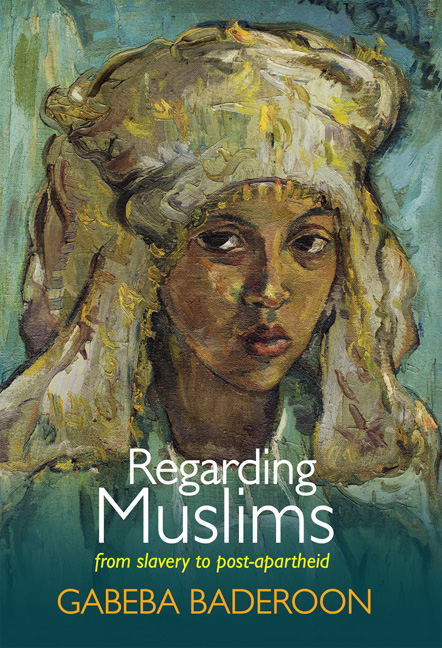Book contents
- Frontmatter
- Contents
- List of illustrations
- Acknowledgements
- Foreword
- Introduction: Beginnings in South Africa
- Chapter 1 Ambiguous Visibility: Muslims and the making of visuality
- Chapter 2 “Kitchen Language”: Muslims and the culture of food
- Chapter 3 “The Sea Inside Us”: Parallel journeys in the African oceans
- Chapter 4 “Sexual Geographies of the Cape”: Slavery, race and sexual violence
- Chapter 5 Regarding Muslims: Pagad, masked men and veiled women
- Chapter 6 “The Trees Sway North-North-East”: Post-apartheid visions of Islam
- Conclusion
- Notes
- Glossary
- Bibliography
- Index
- Plate section
Chapter 3 - “The Sea Inside Us”: Parallel journeys in the African oceans
Published online by Cambridge University Press: 21 April 2018
- Frontmatter
- Contents
- List of illustrations
- Acknowledgements
- Foreword
- Introduction: Beginnings in South Africa
- Chapter 1 Ambiguous Visibility: Muslims and the making of visuality
- Chapter 2 “Kitchen Language”: Muslims and the culture of food
- Chapter 3 “The Sea Inside Us”: Parallel journeys in the African oceans
- Chapter 4 “Sexual Geographies of the Cape”: Slavery, race and sexual violence
- Chapter 5 Regarding Muslims: Pagad, masked men and veiled women
- Chapter 6 “The Trees Sway North-North-East”: Post-apartheid visions of Islam
- Conclusion
- Notes
- Glossary
- Bibliography
- Index
- Plate section
Summary
the sea is so heavy inside us
and i won't sleep tonight.
i have buckets of memory in a jar
that i keep for days and nights like these.
– Mxolisi Nyezwa, “Sea” (2000: 25)Sunday 17 – We saw the coast of the Cape.
Tuesday 19 – Another slave died.
– Hendrik Frappe, Journal of the Slave Ship Leijdsman Returning from Mozambique, November 1715, cited in Westra and Armstrong (2006)At the vantage point at the end of Cape Point Nature Reserve, about an hour south of Cape Town, visitors are invited to gaze at the exact point where the Atlantic and Indian Oceans meet, where some say one can see waters of different hues of blue collide and merge. In truth, the actual southernmost point of the African continent is at Cape Agulhas, approximately four hours’ drive east, and if oceanic waters could ever be distinguished, that is where the two would join. The indeterminacy of the dividing and the meeting points of the two African oceans is an apt metaphor for contemplating the theme of the sea as an archive of intricate meanings about Muslims and slavery. Recent South African poetry, memoir, fiction, art and accounts of pilgrimage present the sea as a protean theme that observes neither national nor temporal boundaries, combines public history with private and autobiographical narratives, and re-envisions the country's geography and temporality. The texts reveal “alternative modernities” alongside those of imperialism, including the temporality and geography of the hajj, and assert new affinities across spatial and historical boundaries (Hofmeyr 2007: 13). In the writings below, the sea is a metaphor for experiences that transcend conventional categories, the juxtaposition of multiple histories, the transformation of the self, and memories of slavery. They map the ocean through memory and ritual.
Despite the country's extensive coastline and long transoceanic history, South African literature has been strangely mute about the sea (Samuelson 2010: 543–57). Because land has been a great obsession for whites and a measure of anguished loss for the indigenous people of South Africa, the fraught theme of land is everywhere in the country's literature and art. As a consequence, it has been possible to turn away from the sea. But the oceans have had a profound impact on South Africa's history and present, so their absence is weighted and meaningful. If we turn back toward the sea, what might we perceive?
- Type
- Chapter
- Information
- Regarding Muslimsfrom slavery to post-apartheid, pp. 66 - 82Publisher: Wits University PressPrint publication year: 2014



